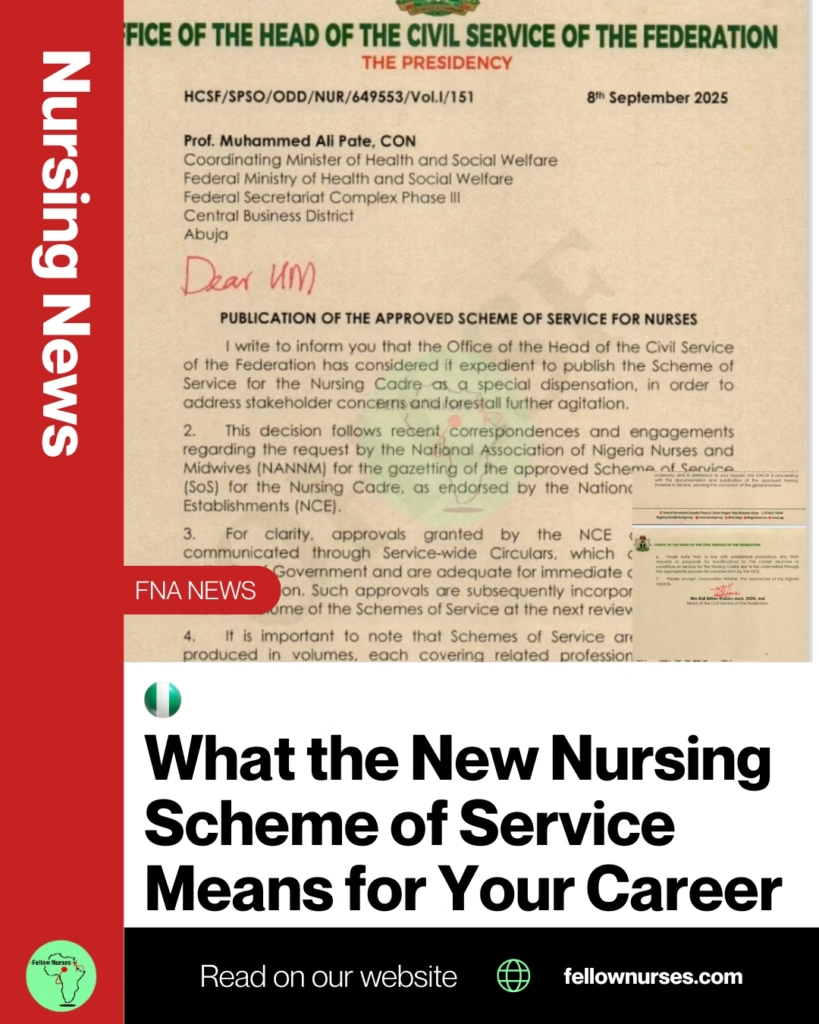Fellow Nurses Africa | Lagos, Nigeria | 10 September 2025

Despite being the backbone of the country’s health sector and comprising its largest healthcare workforce, nurses lacked a dedicated career structure that recognized their unique training, competencies, and contributions to national health outcomes.
For over seven decades, Nigerian nurses have operated within a healthcare system that treated their profession as merely another civil service job role.
That changed on September 8, 2025, when the Office of the Head of the Civil Service of the Federation officially announced the publication of the Approved Scheme of Service for Nurses, a milestone that represents both a victory for persistent advocacy and the beginning of a new chapter for Nigerian nursing.
What This Scheme Actually Means
The newly approved framework is not about salary increases or allowances, as some might assume. Instead, it establishes the foundational architecture for how nursing careers should be structured across Nigeria’s civil service. Think of it as the blueprint that finally recognizes nursing as a distinct profession with its own identity, rather than a generic health service role.
The scheme addresses four critical areas that have long frustrated nursing professionals:
Clear Entry Points: Different nursing qualifications now have defined entry levels into government service.
Degree holders enter at Grade Level 09, while those with dual qualifications (Registered Nurse and Registered Midwife) enter at Grade Level 08.
This eliminates the previous arbitrary placement that often undervalued educational achievements.
Understanding the Grade Level Structure
For many nurses unfamiliar with civil service terminology, understanding the grade level system is crucial to appreciating how this scheme affects career progression.
Nigeria’s civil service uses a numerical grading system where higher numbers indicate senior positions with greater responsibilities and compensation.
The nursing scheme establishes a career ladder spanning Grade Level 07 to Grade Level 17 a ten-level progression that mirrors the profession’s complexity and specialization requirements:
Entry Levels (GL 07-09):
- Grade Level 07: Nursing Officer III – Entry point for single qualification holders (RN or RM only)
- Grade Level 08: Nursing Officer II – Entry for dual-qualified nurses (RN + RM) or those with post-basic certifications
- Grade Level 09: Nursing Officer I/Nurse Educator I – Entry for degree holders or experienced diploma nurses with additional qualifications
Mid-Career Levels (GL 10-12):
- Grade Level 10: Senior Nursing Officer – Requires additional specialization or three years of experience plus continuing education
- Grade Level 12: Principal Nursing Officer – Supervisory roles requiring advanced qualifications or significant experience
Management Levels (GL 13-15):
- Grade Level 13: Assistant Chief Nursing Officer – Unit management responsibilities
- Grade Level 14: Chief Nursing Officer – Department or sectoral leadership
- Grade Level 15: Assistant Director – Strategic oversight of multiple units or institutions
Executive Levels (GL 16-17):
- Grade Level 16: Deputy Director – Senior institutional or ministerial roles
- Grade Level 17: Director – Top-level healthcare administration and policy formulation
Each level requires specific qualifications, experience, and demonstrated competencies. The scheme also accounts for different work environments: hospitals, schools of nursing, and ministry positions with tailored job descriptions for each setting.
This structure ensures that a nurse’s career can progress logically from bedside care through clinical specialization to education, management, or policy leadership roles.
Defined Career Pathways: For the first time, nurses have a transparent promotion ladder with specific requirements for advancement. No more guesswork about what qualifications or experience are needed to move up the ranks.
Standardized Job Descriptions: Each nursing level now has clearly outlined roles and responsibilities, from entry-level positions to senior management roles. This provides accountability frameworks and helps institutions understand what to expect from nurses at different grades.
Professional Recognition: Perhaps most importantly, the scheme acknowledges nursing’s unique contribution to healthcare, moving away from the generic civil service classifications that never captured the profession’s specialized nature.
The Long Road to Recognition
Understanding why this approval matters requires grasping the historical context. Nigeria’s nursing profession has existed since the colonial era, yet it has operated for over 70 years without a fully approved national career framework. Instead, nurses were squeezed into general civil service schemes designed for administrative roles, not healthcare professionals.
This created persistent problems: talented nurses found their career progression stifled, their educational qualifications undervalued, and their professional identity subsumed under broader healthcare categories.
The mismatch between nursing’s actual importance to health outcomes and its bureaucratic treatment created frustration that drove many qualified professionals to seek opportunities abroad.
The National Association of Nigeria Nurses and Midwives (NANNM) has been advocating for this change for decades. Their earlier “Unified Scheme” served as a detailed advocacy document that highlighted the profession’s demands for harmonized career structures. While that document lacked official backing, it laid the groundwork for the successful negotiations with the National Council on Establishments that culminated in this approved scheme.
Implementation: Where The Real Work Is!
Approval is one thing; implementation is another entirely. The scheme carries full government authority and can be implemented immediately without waiting for compilation into larger civil service volumes. However, several critical questions will determine whether this policy translates into meaningful change for working nurses.
Institutional Readiness: Are hospitals, health ministries, and training institutions prepared to restructure their nursing hierarchies according to the new framework? Do they understand the implications for recruitment, promotion, and job assignments?
Resource Allocation: While the scheme doesn’t directly address salaries, proper implementation will require resources for retraining, restructuring, and potentially addressing grade level adjustments for existing staff. Has government budgeted for these transition costs?
Monitoring and Evaluation: Who will ensure that institutions actually follow the new guidelines rather than reverting to old practices? What mechanisms exist for accountability?
Future-Proofing: The scheme establishes current career structures, but nursing education and practice continue evolving. How will the framework adapt to emerging specializations, technological advances, and changing healthcare needs?
Challenges and Opportunities This New Scheme Projects
This policy success comes at a critical time for Nigerian healthcare. The country faces severe shortages of qualified health workers, with many nurses emigrating to countries offering better career prospects and working conditions.
A clear, professionally-oriented career structure could help retain talent by providing transparent advancement opportunities and professional dignity.
However, implementation occurs against a backdrop of expanding nursing education capacity. Annual enrollment in nursing programs has increased dramatically, from 28,000 to 115,000 students. This expansion raises important questions about sustainability and quality assurance that the scheme alone cannot address.
The healthcare system’s capacity to absorb this growing workforce, provide quality clinical training experiences, and maintain professional standards will be crucial factors in determining whether the new career framework achieves its intended goals.
Here are questions you should consider
As the nursing profession celebrates this hard-won victory, several strategic questions demand attention:
Quality vs. Quantity: How will Nigeria ensure that rapid expansion in nursing education doesn’t compromise the professional standards that this new scheme seeks to establish? What quality assurance mechanisms are in place?
Rural-Urban Equity: Will the new career structure incentivize nurses to work in underserved rural areas, or will it primarily benefit those in urban teaching hospitals? How can implementation address geographic disparities in healthcare access?
Continuous Professional Development: The scheme establishes career levels, but what about ongoing education and specialization? How will Nigeria support nurses in developing advanced competencies throughout their careers?
Integration with Health System Reform: Career structures alone won’t fix systemic healthcare challenges. How does this nursing scheme align with broader health sector reforms and universal health coverage goals?
Sustainability: What mechanisms will ensure that future governments honor these commitments rather than reverting to previous practices during budget constraints?
A Foundation, Not a Destination
The approved Scheme of Service for Nurses represents a significant milestone, but it is better understood as a foundation than a final achievement. Like any policy framework, its value will be measured by implementation quality and long-term impact on health outcomes.
For individual nurses, the scheme offers clearer career pathways and professional recognition. For the healthcare system, it provides tools for better workforce planning and utilization. For patients and communities, successful implementation could mean more motivated, professionally fulfilled nurses delivering higher quality care.
However, realizing these potential benefits requires sustained effort from multiple stakeholders. Government agencies must commit to faithful implementation. Healthcare institutions must restructure their nursing services accordingly. NANNM and other professional organizations must monitor progress and advocate for necessary adjustments.
Most importantly, the nursing profession itself must seize this opportunity to demonstrate the value of professional recognition through improved practice standards, continued advocacy for systemic healthcare improvements, and commitment to the ethical foundations that make nursing a trusted profession.
Do you think this new scheme of service will make career progression for Nigerian nurses a journey worthwhile?.
Fellow Nurses Africa is the independent voice of African nurses. We educate, inform and support the nursing profession.










